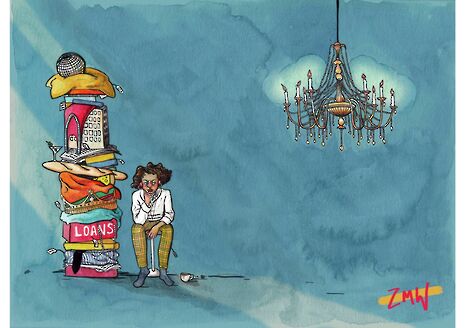The deafening silence around student finance must be broken
Charlotte Lillywhite argues that financial support should be easier to find and less shameful to seek out
Content Note: This article contains discussion of suicide

On 8 March 2016, Jerome Rogers’ body was found in a woodland area near his family home, where he used to play as a child. Jerome had committed suicide after his debt spiralled to £1019, resulting from two traffic fines which he'd picked up while working a zero-hour contract job. The last person to see the 20-year-old alive was a bailiff.
His story featured on the BBC documentary Killed By My Debt. Shortly after the end of the programme, an advert for a prominent bank’s student plans appeared on my screen. A would-be student, using spoken-word poetry, rhythmically expressed his determination to be financially stable and independent of his mum before beginning university. After all, financial insecurity and having insufficient personal funds is just a choice, right? And, of course, this meant being a Real Man, with the archaic ‘man up’ thrown in for good measure. What a joy to see an advertising campaign not only perpetuate but advocate a classist culture of financial shame, directed towards those most vulnerable to it.
There is a tangible assumption that everyone here has money
I was struck not only by this tendency to sideline the cultural and psychological factors surrounding student finance, but also by the discord of the documentary and advert I had seen scheduled within such a short space of one another. How can we decry the young male suicide epidemic while still remaining complicit in a culture of shame which stigmatises issues like debt and personal finance, some of the biggest contributing factors to this epidemic?
The humiliation and subsequent silence surrounding personal finance do not only exist in news stories and in the lives of the working population: they are implicit in Cambridge’s classist culture. Although the 2016/17 Big Cambridge Survey found that 38% of students felt their financial situation had negatively impacted their time at university, there is a tangible assumption that everyone here has money. This assumption fosters a culture in which students are simply expected to be able to afford the extravagance of May Week and frequent formals, without a second thought for the day-to-day costs of living independently.

Of course, we are lucky to have the generous financial support Cambridge offers, but our lack of financial preparation before university – by which those from less wealthy backgrounds are disproportionately affected – alongside this oppressively privileged attitude means many are unable to take full advantage of the financial support available to them. What’s more, this classist assumption also exists on a national level, with the proportion of maintenance loan a student receives determined on the assumption that their parents or guardians will ‘top up’ the rest for their child. This isn’t possible for many, and students are left with maxed-out overdrafts, mounting pressure, and – particularly here – a support system lacking in diverse socioeconomic experience.
The lack of action to combat this issue is unacceptable. Yes, managing your own finances, especially for the first time, is naturally somewhat stressful – I’ll admit it took me longer that it should have to figure out which end of my debit card goes into the machine (unbelievable, I know). But managing this with no financial education while living in a classist culture which equates financial insecurity with shame, especially in an elite institution like Cambridge, forces it to become a burden it doesn’t have to be.
Students are left with maxed-out overdrafts, mounting pressure, and a support system lacking in diverse socioeconomic experience
We are taught by banks rather than by our schools which services we should buy: HSBC urges us to ‘be prepared for life’s unexpected costs’ by subscribing to their overdraft service. Thank you for the advice, but will you prepare us for the reality of living with an overdraft? Their student account offers an overdraft of up to £3000 by third year, which sounds wonderful until you realise that once it gets transferred to a graduate account, anything above £1500 is immediately charged at 19.9% interest. This is something that shouldn’t be banished to the small print of financial agreements: Toby Thorn, a former Cambridge ARU student, used the back of a Barclays letter demanding he repay his £3000 overdraft to write a note before committing suicide back in 2011. His £8000 debt, including a student loan of £5000, was ruled as a major contributing factor.
Young people are drawn into this trap, and many see no way out, having been exploited by a predatory system which claims it wants to help us achieve our goals. If that is the case, why would Camden council have allowed Jerome’s debt to accumulate so extortionately? What kind of logic entails that a 20-year-old who cannot afford to pay two £65 traffic fines would be able to find over a thousand pounds stashed away somewhere?
It astonishes me that our PSHE lessons were spent being lectured on drugs and alcohol, while this silent killer was ignored. I want to confront the financial and access-related struggle in Cambridge which affects diverse areas of student life, and the classist attitudes which simultaneously underpin and burden it. Class privilege does prevail here, but this doesn’t mean that there are no Cambridge students from lower-income backgrounds who are alienated by this assimilating assumption. Student counselling should target this, and every college should give thorough talks in Freshers’ Week about the financial support available. You shouldn’t have to ‘know where to look’ to find this information: it must be impossible to ignore. Privilege must not be the loudest and most-valued voice.
 News / Judge Business School advisor resigns over Epstein and Andrew links18 February 2026
News / Judge Business School advisor resigns over Epstein and Andrew links18 February 2026 News / Gov grants £36m to Cambridge supercomputer17 February 2026
News / Gov grants £36m to Cambridge supercomputer17 February 2026 News / Hundreds of Cambridge academics demand vote on fate of vet course20 February 2026
News / Hundreds of Cambridge academics demand vote on fate of vet course20 February 2026 News / CUCA members attend Reform rally in London20 February 2026
News / CUCA members attend Reform rally in London20 February 2026 News / Union speakers condemn ‘hateful’ Katie Hopkins speech14 February 2026
News / Union speakers condemn ‘hateful’ Katie Hopkins speech14 February 2026










